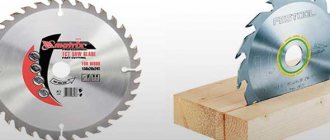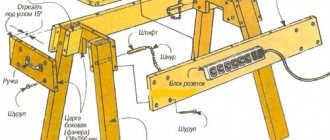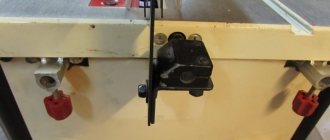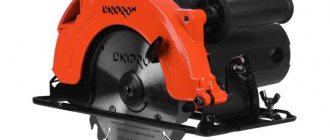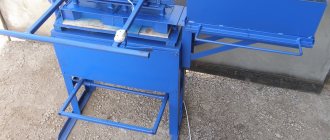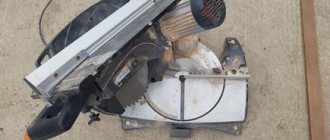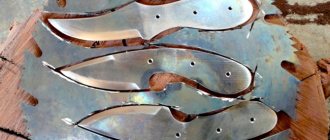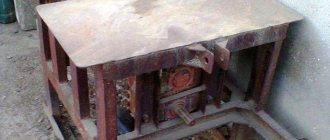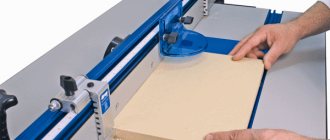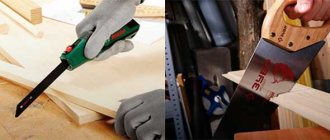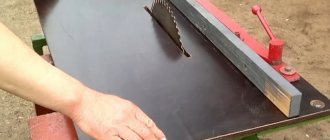Most often, a circular saw is used to separate materials. It can be used to cut plastic, concrete, wood, and metal. You can select discs for different materials, but over time the equipment becomes dull and the cutting process slows down. To restore the sharpness of the cutting teeth, you can make a machine for sharpening circular saws with your own hands and resharpen them.
Disc sharpening
How to know when it's time to sharpen a disc
Cutting discs used for processing wood and wood-based materials experience wear and tear over time, reducing their productivity. To restore the effectiveness of the cutting tool, you will need to sharpen the teeth. You can find out that the teeth on the disk need to be sharpened by the following factors:
- To cut wood, it is necessary to apply force to press the tool against the workpiece being cut.
- There is smoke coming from under the protective casing.
- The protective casing becomes overheated
- There are signs of a burning smell. This means that the teeth do not saw the wood, but cut it
Using a faulty attachment on a power tool leads to a decrease in work productivity, and also increases the likelihood of early failure of the power tool and the attachment itself. A decrease in performance increases the load on the electric motor, which eventually begins to overheat and fails.
This is interesting!
It is irrational to work with a dull disk, since in addition to increasing the load on the power tool, the work time for sawing workpieces increases.
Step by step instructions
Circular saws are sharpened from the underside plane facing the workpiece being cut. If you wish, you can sharpen the saw by first removing it from the machine, although this is not necessary. If you decide to sharpen in a machine, you should first unplug the machine so that it does not accidentally start. Secure the blade stationary by pressing wooden blocks against the saw on both sides. Use a marker to mark the cutter you want to start sharpening with.
It is important to remember how many file strokes you have made, since all subsequent cutters must be sharpened exactly like the first. Strive to make the surface of the incisors as smooth as possible. Remaining nicks will cause rapid tool wear. At the end of the work, plug the machine into a socket and check the quality of sharpening by using an unnecessary block for sawing
Loud noise and uneven operation indicate that the teeth are of different heights. Touch the marker to the incisors and turn the disc counterclockwise. The remaining mark will allow you to identify protruding teeth, the length of which will need to be reduced with a file.
Do not allow the saw to become too dull. The permissible rounding radius of the incisors is 0.2 mm. In addition to significantly lower productivity when working with a dull tool, sharpening such a saw requires many times more time, sharpening the saw in a tolerable condition. The degree of wear can be easily determined both by the appearance of the cutters and by the cut they leave.
What teeth are there on cutting attachments?
At the heart of any cutting device are teeth, the quality of their sharpening affects efficiency and productivity. The teeth on the attachments are made directly from carbide materials. To increase the service life, pobedit soldering is applied to the teeth, which allows you to extend the life of the working attachment by 5-6 times.
The number of cutting teeth on a wheel depends on its diameter. The teeth consist of a front and a back part, which differ in design, as well as a side part. Teeth according to their appearance (geometry) are classified into the following types:
- Straight - a type of teeth used for longitudinal cutting of sheet material
- Trapezoidal shape - the cutting links have a trapezoidal shape, which is an advantage - they need sharpening very rarely
- Bevel links are the most common type of teeth and are characterized by the presence of an angular bevel on the back or front. This design allows sawing not only wood, but also other types of materials such as fiberboard, chipboard, plywood and even plastic.
- Conical - they have the shape of a cone, but their main drawback is that they quickly become dull, so they need frequent sharpening. They are used not only for transverse, but also longitudinal cutting of sheet material
Manufacturers also produce circular saw blades with active and passive links. Depending on the type of teeth, the process of sharpening them differs. To properly sharpen the teeth on a circular saw, you will need to correctly determine the sharpening angle.
Selecting the sharpening angle of the cutting teeth
The links on the cutting attachments have a working area, which has a corresponding sharpening angle. Depending on the type of teeth, the disc can be used in one or two cutting directions. When the links become dull on one part, the disk must be turned around and work continued in the opposite direction. However, this cannot be done with all circular discs; for example, circles with beveled links are not suitable for this.
If you sharpen a circular saw blade with your own hands, then you need to understand that depending on the direction of the cut, you need to take into account the sharpening angle.
- If you plan to saw wood in the longitudinal direction of the grain, then the sharpening angle on the links should be 15-25 degrees
- If the wood is sawn transversely, the sharpening angle is reduced to 5-10 degrees
- The universal sharpening angle is considered to be 15 degrees. With circles with such links you can saw not only across, but also along
When sharpening teeth on saw wheels and disks for circular saws, grinders and circular saws, one more important factor must be taken into account - the density of the material being cut. The lower the density, the higher the sharpness of the tooth should be. If a circular saw is used for sawing plastic or plastic, then the sharpening angle of the blade should be negative.
DIY accessories for a wood router: stops, templates, guide rails
For accurate operation, a milling cutter requires auxiliary devices; at the same time, the sales package of the device includes a limited set of such items.
The market for milling attachments extends from protractors to numerous attachments. The user, for whom this is not enough, can make auxiliary devices himself.
How to sharpen a blade on a circular saw with pobedit tips
Craftsmen often buy wheels that have increased wear resistance due to the presence of special pobedite soldering. These soldering extends the service life of the consumable, but does not make it last forever. The pobedite layer is applied to the links using a special solder. Due to soldering, the geometric shape of the tooth becomes more complicated, and therefore the sharpening process also becomes more difficult. Restoring the sharpness of the teeth must be carried out taking into account precise exposure.
To sharpen the teeth on a carbide-tipped blade, you will need to smooth the cutting edge to 0.3 mm. To perform high-quality sharpening of carbide-tipped teeth, experts recommend using special equipment for this, as well as diamond-coated grinding wheels. If you use an abrasive wheel, it will quickly wear off before the soldered disc can be sharpened.
When restoring the sharpness of links, the following factors are taken into account:
- Saw blades must be sharpened not only on the front, but also on the rear plane. You need to start directly from the front
- When sharpening, the pobedit tip should be in close contact with the diamond sharpening wheel.
- The contact time should be no more than 5 seconds. It is necessary to take into account the time in order to avoid overheating of the metal. If the metal overheats, it will harden and decrease in hardness.
When sharpening, you must also take into account that the thickness of the material being ground should not be more than 0.15 mm. If the procedure is carried out correctly, then at least 30 sharpenings are carried out until the disk with pobedit tips is completely worn out.
This is interesting!
When sharpening discs, you need to take into account that the teeth can have a negative and positive angle.
If a tooth has a negative angle, it is more difficult to sharpen it at home than a positive one. You need to make your own decision about the rationality of restoring the sharpness of tipped discs, since the cost of a diamond-coated grinding wheel is sometimes more expensive than electrical drive equipment.
How to sharpen a disc with a machine
To restore the integrity of cutting discs, two methods are used - manual and automated. Performing the procedure manually is not only difficult, but also time-consuming. That is why it makes sense to buy a sharpening machine for saw blades or make the device yourself.
A simple device for sharpening saw blades is considered to be a sharpener or an emery machine, on the shaft of which you need to attach a special wheel - diamond, CBN, or sputtered silicon carbide. The difficulty in implementing the process is that the equipment being sharpened must be fixed in a stationary position, so holding the disc in your hands while sharpening it is not recommended. This is not only dangerous, but also reduces the quality of sharpening.
This is interesting!
Before starting work, it is necessary to clean the surface of the equipment being sharpened from carbon deposits.
To do this, you can use kerosene, diesel fuel or industrial cleaners. If you do not clean it, the performance of the nozzle can be restored to 75% -80%. Instructions for properly sharpening cutting blades for circular saws:
- Each tooth that is sharpened must be perpendicular to the blade.
- The principle of sharpening is that each tooth of the disk must be brought to the rotating blade (diamond wheel).
- The amount of metal layer removed depends on the magnitude of the clamping force. The more wear or abrasion of the teeth, the more firmly the tool should be pressed against the blade.
- The procedure is performed in a similar way for each link
To sharpen circular saw blades, you do not need to buy special equipment. To a home sharpening machine you need to attach a stand, which consists of a fixed and movable part, as well as a mount. With this device you can easily and quickly sharpen at home.
The task becomes more complicated when it is necessary to maintain the appropriate sharpening angle. To modernize and expand the functionality of the installation, you will need to make a tilt regulator for the movable stand. Bolts and nuts are used as regulators, through which you can set the required angle of inclination of the stand.
The movable stand is a square frame, in the center of which there is a lock for installing the disk. The clamp has the same diameter as the sharpened equipment. A groove is made in the stand through which the required sharpening angle is maintained. It is not difficult to carry out sharpening work, therefore, if you frequently work with wood using a circular saw, it is necessary to make a sharpening machine.
This is interesting!
Carrying out sharpening work in an automated way is much faster and easier, but this will require special equipment. The manual method in this regard does not require any equipment other than a file.
How to sharpen a disc by hand with a file
If an emery machine is not available, the procedure can be performed manually. The principle of sharpening is that the disc being sharpened should be fixed in a stationary position. A vice or clamp is used for this. When the equipment is fixed, all that remains is to pick up a marker and mark the starting point of the work. Next, sharpening work is carried out using a file.
- It is recommended to use a flat file, but a triangular file will also work. The main requirement for a file is that it fits freely between the teeth.
- There is a lot of wear on the front and top of the tooth, so this wear should be restored
- At the initial stage, the back surface of the teeth is restored, and then the front
- When sharpening, you need to apply the same force. In addition, the size of the teeth, or rather their size, must be the same
Carrying out sharpening work by hand is much more difficult and takes longer, so this method is rational only in one case, if you do not have to work with a circular saw often. If work with a tool is carried out frequently, then it is rational to buy an emery machine and make equipment from it for sharpening circular saw blades.
Option 1 - making a simple sharpening machine from a sharpener
The first option for manufacturing the simplest sharpening equipment has the following form:
- On the workbench there is an emery machine, on the shaft of which there is a diamond-coated circle
- A fixed base is made from chipboard. This base simultaneously acts as a guide along which the moving frame will move
- At the next stage, a movable frame is made from chipboard or plywood, the walls of which should be directed downwards and act as a moving mechanism
- A disc clamp of the appropriate diameter is placed on the outside of the movable frame, and a groove is also made
- The result is a finished sharpening machine for saw blades
The manufacture of such a device requires a minimum of time and costs, and the effectiveness of its use is 100%. Details in the video:
Manual carving router
In order to facilitate the process of wood carving, you can use a special manual milling machine.
- With the help of such a tool you can work in almost all techniques and speed up the work process itself.
- The main elements of a manual milling machine are cutters and attachments that have various shapes.
- Each cutter shape is designed to perform a specific function.
- Wood carving can be done with one milling machine or supplemented with elements that are made with other hand tools.
It is worth noting that the router can be horizontal, edge or vertical type. A vertical type milling machine is considered universal.
It can be used for cutting through holes. An edge router is used for processing the ends of products, and a horizontal router is designed for processing the side walls of a product.
Option 2 - how to make a sharpening machine from a grinder and a drill
In addition to an emery machine, you can use a grinder or angle grinder to make a contactor. An appropriate diamond-coated sharpening disc is installed in the spindle of this tool, and the power tool itself is fixedly attached to the base. The principle of manufacturing the conductor is as follows:
- Take a frame made of chipboard or fiberboard measuring 50x80 cm. The components will be located on this frame
- Initially, you should fix the angle grinder motionless using clamps. The tool spindle should be positioned at right angles to the frame
- A movable frame is made and placed at the end of the tool, on which discs for sharpening will be installed.
- Frame mobility is achieved through the use of furniture slides
- A bracket is made on the frame to secure the sharpened equipment
The finished product is shown in the photo below.
How to use, as well as the features of working on a homemade machine for sharpening the equipment of circular saws, is shown in the video.
The result of the work done is the following - restoration of the integrity of the disk with teeth, which allows you to continue working with power tools when processing wood. The methods discussed in the material are suitable for sharpening saw blades of tools such as grinders, circular saws and stationary circular saws. If the principle of performing the work is clear, then there will be no difficulties with the manufacture of a special machine and its operation.
Device and technical characteristics
To make a device for sharpening circular saws, it is necessary to consider the design of ready-made models assembled by professionals. Equipment items:
- A base plate made of a thick sheet of metal on which the remaining parts are located.
- Electric motor with belt.
- Control panel with on and off buttons, additional settings.
- Stand with clamp for circular saw.
- Guides for moving clamps and supports.
- Handles for changing the position of working parts.
- Sharpening disc.
Modern models can be equipped with additional elements: lamps to illuminate the working area, abrasive feed depth limiters, and protective plates.
When choosing a finished machine, you need to pay attention to the following parameters:
- transmission type - gear or belt;
- maximum permissible dimensions of the abrasive wheel;
- sizes of discs to be sharpened;
- permissible values of set angles;
- dimensions, weight of the installation;
- type of construction - floor or tabletop;
- electric motor power;
- control system.
Technical characteristics are selected depending on the size and type of equipment being sharpened.
Equipment design (Photo: Instagram / avtokomplex_42)
